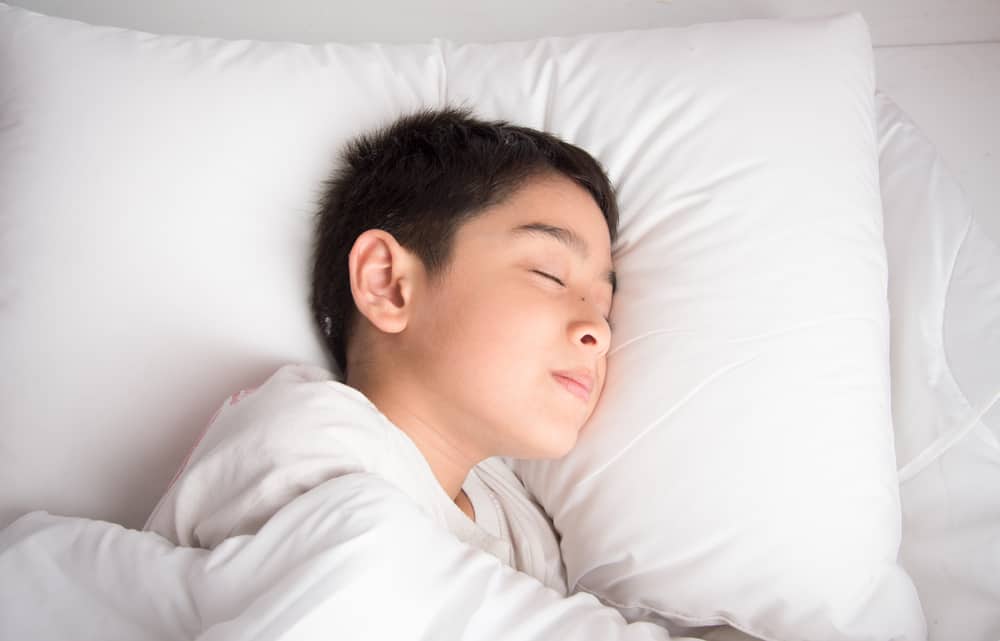Contents:
- Medical Video: How to help your child get a good sleep
- Hyigene sleep guide if the child has trouble sleeping at night
- 1. Consistently go to sleep and wake up at the same time
- 2. Limit your nap time
- 5. Create a comfortable room atmosphere
Medical Video: How to help your child get a good sleep
Is your child difficult to start sleeping at night, or does he often wake up in the middle of the night and find it hard to go back to sleep again? If the child has trouble sleeping at night, he will easily get tired and fall asleep during class lessons. As a result, he will miss a lot of important information about his subjects. Sleep deprivation has also long been associated with a variety of serious health problems for children in the future, ranging from obesity, diabetes, to heart disease. If you don't want your child to deal with the negative consequences above, start teaching him the sound sleep technique called sleep hygiene. What is the sleep hygiene guide for children like? Here's the review.
Hyigene sleep guide if the child has trouble sleeping at night
Sleep hygiene is a clean sleep pattern. It means "clean sleep" here is not going to sleep in a clean, fresh body condition after taking a shower and brushing your teeth, but rather applying healthier sleeping habits to cleanse all kinds of disorders that usually make you sleep less or sleep badly.
This healthy sleep pattern helps build better sleep habits and makes you more disciplined and consistent in living it, to help improve sleep clutter and overcome sleep disorders such as insomnia. Gradually, sleep hygiene helps reduce the negative effects of sleep deprivation.
What is the sleep hygiene guide if the child has trouble sleeping at night?
1. Consistently go to sleep and wake up at the same time
Schedule of going out and waking up on time is one of the most important first steps if you want your child to sleep better. If he is used to sleeping regularly, his body will get used to it. As much as possible schedule sleep and wake up at the same time every day, even on his day off.
However, adjust it first with the ideal night sleep duration for children. The average elementary school age child needs to sleep around 9-11 hours a day. So for example children need to wake up at 5 a.m. every day, then you should make sure the child is ready to sleep and is in bed at 8pm (+/- 20 minutes). Avoid sleeping too late.
By adhering to a regular sleep schedule every day, the child's body becomes lighter, warmer, and the cortisol hormone is also released more regularly, giving it more energy and long-lasting activity.
2. Limit your nap time
Children need naps to help meet their sleep needs in a day. But you have to be careful in setting the length of time, because if the child sleeps late he will feel more refreshed at night and eventually sleeplessness.
Limit your child's nap to a maximum of only 30 minutes, and do it before 3 pm Even if it's only for a while, napping can help improve a child's mood, focus, and energy.
3. Create a special ritual before the child sleeps
Take time to prepare for sleep for 90 minutes before bedtime. For example, if you know your child should go to 8 o'clock at night, stop any burdensome physical and mental activity such as exercise or doing school work at 6 pm - the sooner the better, if possible.
Use this free time for children to take a bath / take a warm bath, drink milk, brush their teeth, or for you to read stories before going to bed. The bedtime routine can remind the child that this is the time to get to bed immediately.
Taking a warm bath a few hours before going to bed can increase body temperature, causing the child to get sleepy when the body temperature returns. Research shows that drowsiness is associated with a decrease in body temperature.
Also use the remaining time available for you to prepare all your children's needs the next day, including uniforms and school bags and provisions to avoid the stress of being overwhelmed in the morning.
4. Create a bedroom just to sleep
Tell your child that the bed is only for sleeping. Don't do other activities in bed other than to sleep. Avoid activities that can make the child even more energetic before going to bed, for example playing and watching TV.
5. Create a comfortable room atmosphere
Try not to get children to use the bedroom for things other than sleep, for example to play or do homework. Gradually, the child's body becomes accustomed to connecting the bedroom to resting time.
Keep the computer, cellphone, TV, and other electronic devices from the child's bedroom. The emission of bright light from electronic devices works to mimic the nature of the sun's natural light. As a result, the body's biological clock considers this light as a signal that it is still morning, and therefore the production of melatonin (sleepy trigger hormone) becomes disrupted.
Make a child's bedroom an ideal place to sleep. The atmosphere of a comfortable, dark, quiet and cool room can help children sleep better. The ideal room temperature for deep sleep is around 20-22 ° C.
Give your child his favorite blanket and doll near his bed so he feels comfortable. A hug from you can also make him feel safe and calm.
6. Limit consumption of food and drinks before going to bed
Avoid eating large portions before going to bed. Eating heavy foods, fatty or fried foods, spicy dishes, citrus fruits, and carbonated drinks too close to bedtime can trigger indigestion for most people, especially children.
Lying after a meal can cause stomach acid to rise back into the throat, causing the stomach to go down and the throat feel hot which makes it easy for children to wake up in the middle of the night.
Also avoid drinks or foods that contain caffeine such as soda, chocolate, tea, and coffee, especially close to bedtime. The stimulant effect of caffeine can last for several hours even when taken 3 hours before going to bed. In addition to making it difficult for children to sleep at night, caffeine also makes it often wake up in the middle of the night because of anxiety or back and forth urinating.
If the child still can't sleep ...
If your child still can't sleep well, you can do something that makes him sleepy like reading a story book that might look boring. He will return to bed when he is sleepy. If he hasn't slept in 20-30 minutes, you can repeat it.
Another way to help children who have difficulty sleeping at night is to teach them how to breathe deeply while imagining a calm, pleasant view, such as being in the mountains or the seashore. This can help children relax more.












